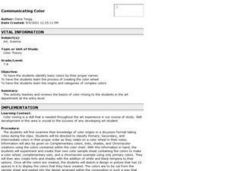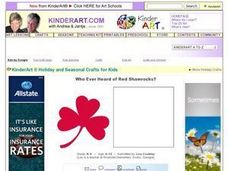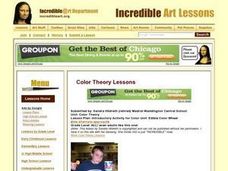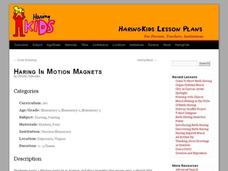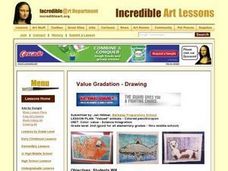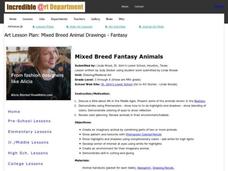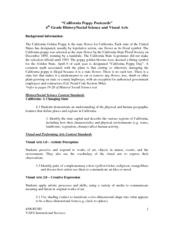Curated OER
Warm/Cool Leaves
Young scholars examine the difference between warm and cool colors. They discuss the basic color wheel, reviewing primary, secondary and complimentary colors. An activity allows students to discover how to mix the warm and cool colors.
Curated OER
Wandering Ink Drawings
Kids explore how they can go with the flow and be flexible when they encounter "happy accidents." They use ink and watercolor to create flowing and unplanned art pieces.
Curated OER
Communicating Color
Students identify basic colors by their proper names. They explain the process of creating the color wheel and explore the origins and catagories of complex colors.
Curated OER
Color Me Happy: Color, Mood, and Tone
High schoolers identify color schemes in paintings and discuss the ways in which color is used to convey a mood or tone in a work of art.
Curated OER
Learn the Colors Black and White
In this early childhood color recognition and handwriting worksheet, students practice writing the words black and white by tracing the words and then writing the words on their own. In addition, students draw something black and white.
Curated OER
Dreaming with Marc Chagall
Students scrutinize the early twentieth-century artists who dealt with expressionism and abstraction, especially Marc Chagall. This four lesson unit examines the life and work of Chagall and supports the student creation of works similar...
Curated OER
Who Ever Heard Of Red Shamrocks?
Students discover optical illusions in this lesson that uses a red shamrock and white construction paper. Emphasis is placed upon inquiry, experiment, and then a short discussion on optical illusions and complimentary colors.
Curated OER
Gee's Bend Quilts
Third graders identify five new facts about the quilts, women, and community of Gee's Bend and finish their quilts by sewing the four edges of the quilt down. They review the color wheel and what the terms Primary, Secondary, Analogous,...
Curated OER
Introductory Activity for Color Unit: Edible Color Wheel
Young scholars use food coloring and frosting to make an edible color wheel. They identify the primary colors and experiment with mixing colored frosting to produce the secondary colors. Students then eat their color wheel.
Curated OER
Haring In Motion Magnets
Students research visual arts by creating an art project for their homes. In this art analysis lesson, students identify the work of Keith Haring by researching the Internet and examining images. Students utilize tempera paints, poster...
Curated OER
Informal Group Portraits
High schoolers explain one artist's approach to the Impressionist's use of art elements and design principles. They create an Impressionistic painting that contains two figures.
Curated OER
Mixed Breed Animals Art
Students create an animal in the tradition of medieval animal combinations. They choose components from various animals and design a new animal from those parts. Students draw their animal with careful attention to surrounding...
Curated OER
Inhale the Colour of Life
Pupils view examples of portraits noting how the colors used make them feel. Using the same portrait, they redo them using different colors and then compare and contrast the first painting and second one in regards to how it makes them...
Curated OER
Color Me Happy: Color, Mood, and Tone
This lesson introduces students to the ways artists use color to set the tone of a painting or to convey a particular mood to the viewer. Students view "The Tragedy" by Pablo Picasso. They fill in an information chart describing the mood...
Curated OER
Edible Color Wheels
Students create an edible color wheel using cookies and frosting. They mix tints into frosting to simulate the color of the color wheel.
Curated OER
Valued Animals - Colored Pencil and Crayon
Second graders see that pressure of crayon create range of values. They show value range with crayons in an art work. They see how value is used in works of art and explain the importance of animals and their environment.
Curated OER
Sensational Symmetry
Stdents create symmetrical designs by cutting folded paper in this cross-curricular lesson for the Math and Art classsroom. The lesson is adaptable for any grade or ability level.
Curated OER
Mixed Breed Fantasy Animals
Ever seen a crockapeep or a giraffule? How about a catmel? Elementary school artists are encouraged to let their imaginations roam and create images of imaginary creatures by combining parts of two or more animals,
National Endowment for the Humanities
Lesson 1: In Depth with the Full Spectrum
High schoolers study the ways in which an artist can use color. They view various images of artwork and discuss the effect of color on spacial dimensions, focal points, tone, and mood.
Curated OER
California Poppy Postcards
What a great lesson! Learners discuss California history, including the state flower, the poppy, and then engage in an art activity. For the activity, they learn about value, shading, layering, blending etc. to produce a realistic...
Curated OER
Color in 3-D: A Nature Design Project
Students view a film about Hans Hofman and consider his use of color and layering. They experiment with the concept of 'push and pull' by using warm and cool color schemes in a tracing of leaves and shapes. Students view their work using...
Curated OER
Andy Warhol Animals
Students view and identify the colors on the color wheel. After viewing a PowerPoint, they discuss the reasons why animals become endangered. They examine the life and works of Andy Warhol and review contour drawing. To end the...
Curated OER
4 Part Color Study in Painter Classic
Students use the Wacom tablet to demonstrate observational drawings, design principles, and color schemes. Students create four different images of a common art or graphics tool based on four color schemes and a different effect.
Curated OER
Keith Haring Painting Project
Students paint a picture based on the work of Keith Haring including Haring people. In this painting lesson plan, students also look and discuss the art of Keith Haring.




